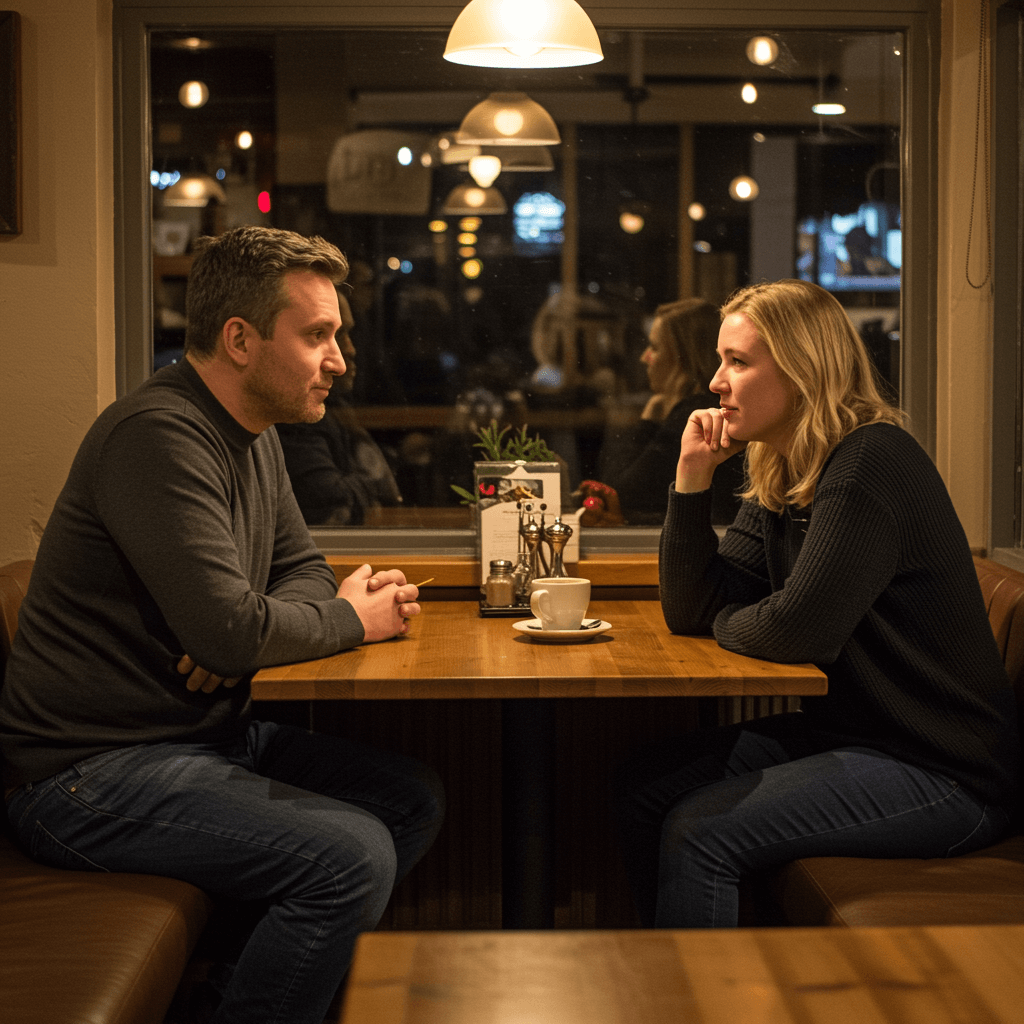It can be incredibly confusing to weigh staying in a secure but uninspiring partnership against ending it to chase something more passionate, unpredictable, and risky—with the hope that it might grow into genuine love. For people raised in traumatic environments, the pull toward extremes—either absolute safety or utter danger—often feels irresistible. What’s more difficult is building a relationship that contains elements of both safety and excitement. Today’s letter comes from a woman I’ll call Sage. She writes:
Hi Anna — I’m completely disoriented. I can’t tell whether I should break up with my partner of 15 years or if these feelings are just limerence and CPTSD talking. Could you help me sort this out?
Okay, I’ve got my fairy pencil ready to mark things I want to revisit on a second read, but let’s go through Sage’s story and see what’s happening.
Sage’s letter continues: I grew up in an abusive, neglectful home. My father was emotionally distant and psychologically abusive. My mother struggles with severe CPTSD and other mental health problems; she scapegoated me, displayed odd sexualized behavior toward me, blamed me for her self-harm attempt, said I was her mother from a past life, and so on. My stepfather was both physically and emotionally abusive. We were poor, and there was also a deliberate withholding of food and basic needs. I’m not sure whether I was sexually abused — my mother claims I was, but she isn’t a reliable source. I’ve been with my partner, Gabe, for 15 years. We were good friends for a few years, had sex one night, then his lease ended a few weeks later so I let him move in, and we’ve been together ever since. Gabe is my first romantic partner — my first everything. He’s steady, generous, easygoing, and provides for me in ways that feel almost unimaginable: he buys groceries, brings dinner home often, does more than his fair share of housework, insists on driving me so I don’t have to take the bus, and so on. We’re both 42. I feel overwhelming guilt that he takes such good care of me, and I feel worse because I keep thinking about leaving him. Gabe shuts down whenever we try to talk about the relationship. I’ve stopped bringing up important topics because every time it ends in pain: he won’t engage, he gets distracted by his phone, and if I ask whether he needs time to process he’ll say yes and then “forget” what we were discussing. I feel like I’ve tried everything and I’m resentful. I don’t want to be intimate with him anymore; I recoil when it happens. He refuses couples therapy and won’t do any formal relationship work with me.
About a year ago I joined an online art forum and made wonderful friends. I’m ashamed to admit that I’ve become limerent for one of them — let’s call him Jack. He’s kind, funny, thoughtful, talented, takes me seriously, and we share values and interests. We became friends online, and I think he might have been developing feelings for me until I scared him away. I became obsessive and desperate for his attention: emailing him too much, commenting on every post, flirting over the top. He pulled back. In his last message he said he’s going through something hard and would reach out when he felt better. It’s been over a month and I doubt I’ll hear from him meaningfully again. He still likes my posts and compliments my art occasionally. I’m ashamed of how I acted. I know I crossed a line with Jack. I tried to tell Gabe about it, but he stopped me — he said he didn’t want to know. I think about breaking up with Gabe every day, but I don’t know if that’s the right move. I don’t trust my own judgment — I suspect part of me hopes a breakup would lead to getting together with my limerent object. I can’t imagine a healthy person wanting me. The thought of breaking Gabe’s heart and leaving him alone feels worse than death. I don’t think I could do it. I’m devastated and don’t want to make things worse than they already are. Thank you for all you do.
All right, Sage — thank you for writing. This situation is sadly familiar to many people with trauma histories. First, given what you endured growing up, you deserve recognition for having stayed in a stable relationship for so long. That’s an achievement, even though I’m not saying you must remain — it’s simply notable that you found safety. The childhood you describe — a psychologically abusive, distant father, a mother with severe mental illness and inappropriate boundaries, a stepfather who was abusive, and basic needs intentionally withheld — is the kind of environment that often produces a limerent adult. Looking at the patterns I see in people who experience limerence, this background appears frequently: addiction, emotional unavailability, and a sense that nobody could really meet you as a person or hear your needs. As kids we often develop a hardiness and tell ourselves we can meet our own needs, that we don’t require deep love, and that imagination will get us by. That survival strategy may help you get through childhood, but when it carries into adulthood it can become a liability: it prevents you from fully loving others and from receiving love.
Let me restate some key facts: you’ve been with Gabe for 15 years; you were close friends first, had sex one night, and then he moved in when his lease ended — a casual origin rather than a conscious decision to commit. He became your partner by proximity and convenience, and that’s how you both settled into this life. He’s your first relationship, and he provides tangible care: groceries, meals, chores, rides. You’re 42 now, and that may influence how you view future possibilities, but relationships at your age are still very possible. You feel guilty because he looks after you so well, and guilty that you contemplate leaving him.
At the same time, Gabe is emotionally unavailable. That lack of capacity for emotional closeness mirrors your childhood experience — you adapted to needing people who couldn’t meet you emotionally, which kept you safe then but is painful now. You’ve learned to avoid bringing up important issues because they’re so fraught: he withdraws, checks his phone, asks for processing time and then “forgets,” and refuses therapy or relationship work. You’ve grown resentful, feel repelled sexually, and can’t sustain meaningful emotional conversations with him. That pattern is understandably unsatisfying.
About Jack and the online connection: online interaction is an environment that encourages fantasy. It’s easy to project hopes onto someone you’ve never shared life with, and meeting in person often reveals a very different reality — chemistry, habits, and compatibility change when you’re face-to-face. If Jack lives elsewhere or your contact has been mainly virtual, that distance may feed the idealization. From his perspective, your intense emailing and constant attention would register as behaviors, not as your internal motives. If he told you he’s in a rough patch and would reach out later, that’s often a gentle brush-off people use to avoid a direct rejection. It’s been a month, and you suspect he’s unlikely to pursue something serious while you’re still in a long-term relationship; that’s probably realistic. A healthy person would be unlikely to pursue someone who’s living with a partner of 15 years — attempting to do so would be a red flag for them. So you can’t fairly evaluate his potential while you’re still in a relationship and emotionally on the fence.
If you were to leave Gabe, get single, and spend time on your own, you could then test whether Jack or someone else is a viable romantic match. Trying to “find” your next partner while still with Gabe rarely ends well. Limerence works like avoidance: it channels emotional energy into an impossible fantasy object rather than into the people actually present in your life, which prevents genuine connection. You worried you might never find someone else, or that dating will bring drama and regret for giving up the steady care Gabe provides. Both are possible outcomes.
What I hear most clearly is that you are not emotionally available right now. Being available means clearing entanglements — not pursuing relationships with people you’re not fully committed to. Healthy people tend not to be attracted to someone entrenched in a long-term relationship with an emotionally closed partner. Carrying secrets or half-lives often produces painful, regrettable outcomes, even if occasionally it leads to marriage. If what you truly want is a passionate, reciprocated romantic love — whether with Jack or someone else — you need to be single long enough to live your own life and learn how to meet your emotional needs independently. Dating inevitably involves risk, disappointment, and learning; without inner work, you’ll likely repeat patterns and end up in a new relationship that mirrors the same unavailability you’re already used to.
You have a real chance here to build a genuine, whole partnership someday, but that requires some internal repair. “Do some healing” often sounds vague and frustrating, so let me be clearer: healing is an individualized discovery process. Some people work through it in therapy; others do it by committing to activities or creative pursuits they deeply care about, joining groups, or pursuing professional goals that bring them more fully into themselves. As you become more fully expressed, the people who appear in your life will shift to better match you. The worst thing is inaction. It helps to take concrete steps: try new activities, go to events alone, accept invitations, practice being present with people, and decide who will share holidays with you. It’s painful and scary to leave safety, but holding on to a relationship out of fear robs both partners of the chance to find someone who truly matches them. Staying solely to avoid hurting Gabe would not be a kindness if it prevents him from finding someone who can love him fully.
When your life is joyful, satisfying, and rich, your tendency toward limerence will likely decrease: you won’t feel compelled to project all future excitement onto an unreachable online fantasy. Choosing to step away will require courage — not because Gabe is abusive (he isn’t, from your description) but because the relationship is bland and emotionally stagnant. Your statement that leaving him would feel worse than death might be a sign of deep love, but it could also be overwhelming guilt you haven’t yet processed. It’s important to find ways to relieve and work through those emotions. Guilt and shame are heavy burdens, and limerence often functions as a retreat from the fear of being with people in a messy, intense way.
If you’d like resources to help you become less dysregulated and more present with others, there are methods and materials available. One such program is called Re-Regulated, which teaches a straightforward method you can use even without ongoing professional support. It’s aimed at helping people manage dysregulation, reduce overwhelm, repair disconnection, and stop the self-defeating cycles that lead to staying in loveless partnerships or becoming limerent for people who aren’t available. There are also courses, including a free one called The Daily Practice, and a downloadable reflection called How to Get Ready for a Great Relationship to help you identify where you’re ready and where you still need work. Those resources are designed to help you prioritize healing and prepare for a healthier partnership.
In short: it’s understandable that you feel torn. The evidence you’ve described points to a pattern of emotional unavailability on both the family-of-origin side and in your current partnership, and limerence has arisen as a symptom of being unfulfilled. If you want the kind of romantic connection you imagine, the most honest path would be to become single and do the inner work needed to become emotionally available — then you can date without carrying the same wounds into a new relationship. It takes bravery, but it also opens the possibility of finding a partner who can both care for you and be present with you emotionally. [Music]













